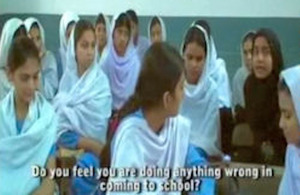DFID Research: A Small Dream
How one girl's dream of going to school has inspired other young Muslim women

Scene from the film A Small Dream
“I want the students to excel in life and to proudly claim that they once studied in Moach Goth Replication School…At times when people would taunt us in the streets saying ‘she thinks she is the guardian of our community’s wellbeing…’ I would pray in my heart - give me no home, but grant my children a good school; grant me only this that in comparing [my home and the school], people see my sincerity and years of toil; and recognize that I have not worked for myself, but only for this small dream…”. Humaira Bachal.
As a first grade student, Humaira was the only one to go to school while all her friends played in the streets. She used to think school might be a punishment. She soon came to believe that she was the privileged one. She remained troubled by this until, still only in fifth grade, Humaira thought how she might redress this injustice: she would teach children at home the lessons she had learnt in class. Roping in her younger sister, Tahira, Humaira begged students to donate the unused pages of their old notebooks and pencil stubs, and started teaching every day after school. She was fully supported by her mother, Zainab Bibi, who endured social boycott, verbal and even physical abuse to give her girls the education they needed to enable them to break a cycle of disempowerment that she had also suffered. Backed by her mother, Humaira overcame initial resistance from her father and brothers at home and the conservative attitudes and reluctance of community members.
A born leader, Humaira soon persuaded other classmates and juniors at school to join in. The young girls hit a hurdle, however, when, using every available space including the kitchen floor, the Bachal’s modest home could not accommodate any more children. Self help had reached its limits and Humaira was on the verge of giving up when her endeavours came to the notice of an organisation running street schools in the adjacent equally poor neighbourhood of Lyari. When the men from Anjuman-e-Raza-e-Mustafa (ARM) Youth Welfare Society visited, they were stunned by the amazing commitment and achievements of these “mere children”. Impressed, the ARM mobilized support from the Rotary Club. Today, five years later, the Moach Goth Replication School educates over 700 students in four shifts, including adult literacy classes for young women. The young teachers all continue their own education at the same time as they teach others.
How a film is telling Humaira’s story
The DFID-funded Women’s Empowerment in Muslim Contexts (WEMC) programme has now helped tell Humaira’s story through training director Gulnar Tabassum in documentary film making. Gulnar has produced ‘A Small Dream’ about Humaira’s school which was launched in March, 2009. The film’s premiere was in Lahore at the South Asia Free Media Association, with Humaira, Tahira and Zainab Bibi attending. The film has since been a great success. It has been shown at the Gender Studies Department of the Lahore College for Women University (LCWU) and has been featured on the LCWU radio station. It is also being used in teaching by other universities in the city.
The film, especially the debate on culture and women’s status, has found profound resonance in the WEMC programme itself. The film, which will soon be broadcast on a local cable network in Balochistan, has also invigorated the commitment to strive for women’s rights amongst members of the newly formed Nissa Women Welfare and Social Development Organisation which WEMC helped set up.
Humaira’s achievements go far beyond converting the view of education - especially for girls - from a ‘suspect activity’ into a valued asset amongst the community’s ethnically diverse groups. Supported by ARM, this small group of teenage girls have steadily transformed gender relations within the community, through awareness about women’s legal rights and discussions around gender relations, culture and marriage.
In 2007, Humaira ‘retired’, she says, from the school ‘in order to earn a living’; 19 year old Tahira is now the principal. Humaira still dreams of making her school a permanent long-lasting institution. The Rotary Club has promised Humaira that they will build the school providing she can secure land. An empty plot of land is available, but the young teachers need Rs. 800,000 (£6,600) to purchase it. The film is helping to spread the word and raise funds. ARM hopes to use Humaira’s school as a model for transforming their street schools - which are often literally held on the streets - into regular schools.